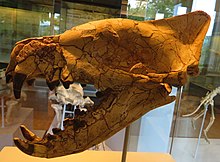Hyaenodontoidea
Appearance
| Hyaenodontoidea | |
|---|---|

| |
| skull of Hyaenodon horridus | |

| |
| fossil of Lesmesodon edingeri | |
| Scientific classification | |
| Domain: | Eukaryota |
| Kingdom: | Animalia |
| Phylum: | Chordata |
| Class: | Mammalia |
| Order: | †Hyaenodonta |
| Superfamily: | †Hyaenodontoidea Leidy, 1869[1] |
| Families | |
Hyaenodontoidea ("hyena teeth") is a superfamily of extinct predatory mammals from extinct order Hyaenodonta. Fossil remains of these mammals are known from early Eocene to early Miocene deposits in North America, Europe and Asia.[2][3]
Classification and phylogeny
[edit]Taxonomy
[edit]- Superfamily: †Hyaenodontoidea (Leidy, 1869)
- Family: †Hyaenodontidae (Leidy, 1869)
- Family: †Proviverridae (Schlosser, 1886)
See also
[edit]References
[edit]- ^ Leidy J. (1869.) "On the extinct Mammalia of Dakota and Nebraska: including an account of some allied forms from other localities, together with a synopsis of the mammalian remains of North America." Journal of the Academy of Natural Sciences Philadelphia 7: 1–472.
- ^ L. Van Valen (1967.) "New Paleocene insectivores and insectivore classification." Bulletin of the American Museum of Natural History 135(5):217-284
- ^ Floréal Solé; Bastien Mennecart (2019). "A large hyaenodont from the Lutetian of Switzerland expands the body mass range of the European mammalian predators during the Eocene". Acta Palaeontologica Polonica. 64 (2): 275–290. doi:10.4202/app.00581.2018.
